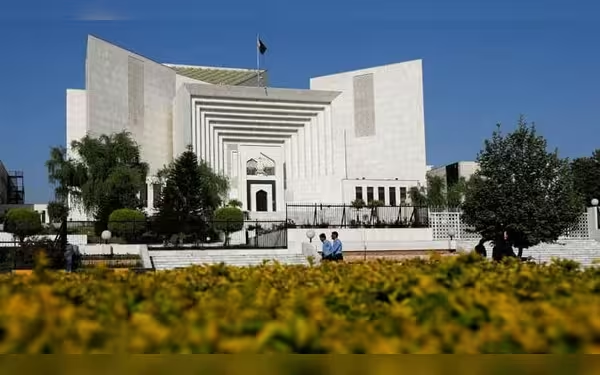Saturday, November 16, 2024 05:41 PM
Supreme Court Supports PTI's Claim for Reserved Seats in National Assembly
- Supreme Court affirms PTI's eligibility for reserved seats.
- ECP criticized for failing democratic responsibilities.
- Judgment emphasizes voters' rights over procedural issues.
 Image Credits: geo
Image Credits: geoSupreme Court rules in favor of PTI for reserved seats, criticizing ECP's actions and emphasizing voters' rights.
The Supreme Court of Pakistan has recently issued a detailed judgment regarding the reserved seats case, which has significant implications for the Pakistan Tehreek-e-Insaf (PTI) party. This ruling comes in the wake of concerns raised by National Assembly Speaker Ayaz Sadiq, who had previously communicated with the Election Commission of Pakistan (ECP) about the challenges in implementing the apex court's earlier orders. The judgment, spanning 70 pages and authored by Justice Mansoor Ali Shah, reaffirms the PTI's status as a legitimate political party eligible for reserved seats in the National Assembly.
In the judgment, the Supreme Court emphasized that the Constitution and the law do not prevent any political party from fielding candidates. This statement directly counters the ECP's earlier decision to revoke the PTI's electoral symbol, the "bat," due to alleged irregularities in its internal elections. The court's ruling highlights that the lack of an electoral symbol does not diminish a party's constitutional right to participate in elections.
The Supreme Court's decision also criticized the ECP for its actions, stating that the commission had failed in its role as a fundamental guarantor of democratic processes. The court pointed out that the ECP must recognize its constitutional responsibilities and ensure free and fair elections to maintain public trust. The judgment further noted that the ECP's behavior in this case was akin to that of a "primary contesting party," which is not its intended role.
Moreover, the court addressed procedural concerns regarding the PTI's involvement in the case. While typically, a party must formally apply to be included in a case, the court asserted that this situation was unique, revolving around the fundamental rights of the electorate. The judgment underscored that the right to vote is paramount and should not be overshadowed by procedural technicalities.
In light of the ruling, the Supreme Court has directed the ECP to notify the PTI members regarding their reserved seats, reinforcing the party's position in the political landscape. This decision is particularly significant as it comes after a tumultuous period for the PTI, which had faced challenges following its removal from power in the February 8 elections.
As the political landscape in Pakistan continues to evolve, this judgment serves as a reminder of the importance of upholding democratic principles and ensuring that all political parties have the opportunity to participate in the electoral process. The Supreme Court's ruling not only impacts the PTI but also sets a precedent for how electoral bodies must operate in a democratic society. It is crucial for the ECP to learn from this experience and strive to maintain the integrity of the electoral process, ensuring that the voices of the electorate are heard and respected.













